Please keep the forum protocol in mind when posting.
November judge meeting - Outside Assistance
Nov. 2, 2016 07:55:01 PM
- Philip Böhm
- Member (International Judge Program), Judge, Tournament Organizer
- German-speaking countries
November judge meeting - Outside Assistance
For a better player experience, the judge program seeks to provide stability in rulings. Different players should receive the same ruling about a certain situation by different judges. The same situation should not be punished by one judge, but let go by another. Some aspects of the Infraction Procedure Guide still lack this consistency in practical execution, noticable through many questions or player-stories on a given topic, I believe those topics are mainly Unsporting Conduct, Slow Play and Outside Assitance.
I noticed there were more discussions/questions about TE - Outside Assistance recently, which means to me it is not clear how certain situations get ruled on events by different judges.

We're still alive in Frankfurt. And we still meet every month. Mostly, there's more non-judge-talk than judge-talk so it wasn't worth reporting about it in late summer. For the meeting in November, I decided to try to strengthen the consistency on rulings and knowledge about TE - Outside Assistance in my area.
IPG 3.2 Outside assistance definition
Definition // Penalty: Match Loss
A player, spectator, or other tournament participant does any of the following:
• Seeks play advice or hidden information about his or her match from others once he or
she has sat for his or her match.
• Gives play advice or reveals hidden information to players who have sat for their match.
• During a game, refers to notes (other than Oracle™ pages) made before the official
beginning of the current match.
Philosophy
Tournaments test the skill of a player, not his or her ability to follow external advice or directions. Any strategy advice, play advice, or construction advice from an external source is considered outside assistance.
Here's the specific situations we discussed, typically Adam is in a game against Berta, Steven is the Spectator that may have committed Outside Assistance. We assume no premade code between players and Steven, nor bad intent. It is Competitive REL.
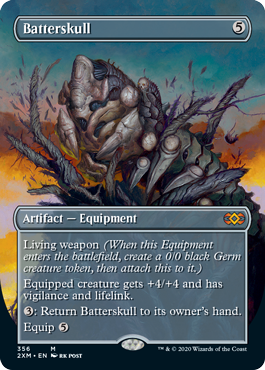
1. "Batterskull"
Adam casts Batterskull, but doesn't put a 0/0 Germ token onto the battlefield. He is about to make more game actions, but Steven (gently) throws a physical copy of a 0/0 Germ token on the table.
Steven reminded Adam of a triggered ability. Even if the trigger is still missed, Adam being made aware that he has no creature on the battlefield that way received play advice. We agree on Outside Assistance
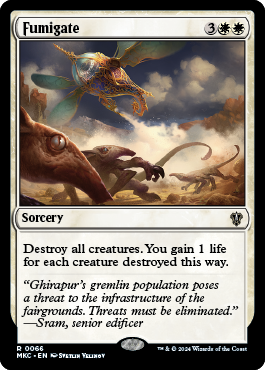
2. "Lol, rekt! Fumigate"
Berta controls 10 creatures. Adam controls none. Steven sees a Fumigate in Adam's hand and shouts “LOL REKT!!! Pulling out the 1 to 10 trade!”
This is textbook OA because Steven, although not completely explicit, revaled hidden information: content of Adam's hand, to the players.
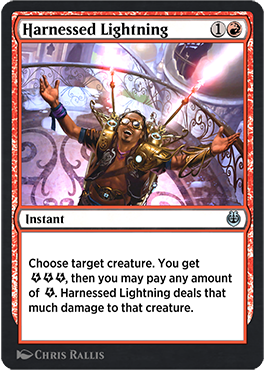
3. “Not enough removal?”
During deckbuilding of a Sealed GP, Steven, having finished deckbuilding wanders around and sees Adam, with Adam's deck layed out in front of him. Adam is not finished yet, he ponders silently about the last decisions. Steven casually comments: “Nice bombs, but I think it's too few removal?”
This is also textbook OA, because Adam isn't done deckbuilding yet. Steven advises Adam to play more removal spells in his Sealed deck.
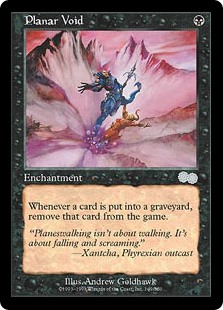
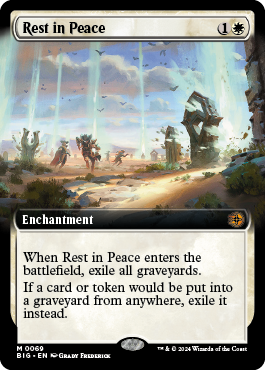
4. "Planar Void vs Rest in Peace"
Adam controls Planar Void. A creature under Berta's control dies. She puts the creature into her graveyard, Adam misses the Planar Void trigger. Steven, spectating the match says “Stop, you have to exile that creature!”, thinking Planar Void worked like Rest in Peace (as replacement effect).
We agree that this is a case of Outside Assistance. It is unfortunate, because Steven thought a Game Rule Violation occurred, as it would be the case with Rest in Peace, but in the end, he reminds Adam of a triggered ability, which he will likely remember from now on.
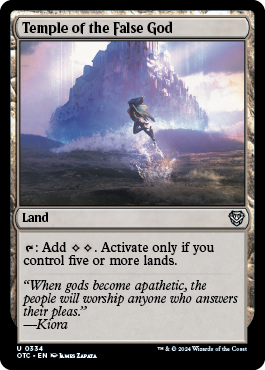
5. “19 lands”
For the fifth time in a row, Adam draws a land and holds forth about his bad luck flooding out now. Steven asks “How many lands do you play?” and Adam replies “19”. Steven now says “Well, that's probably too many lands.”
Here, we had very varied perspectives. Some say “It's not so bad.”, some say it's technically OA, but feels really bad and shouldn't be OA, some say it is “just not OA, but close”, some say it depends on several factory.
What do you say ? Does it matter in which game of a match we're at ?
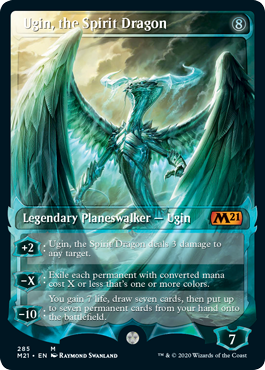
6. “Ugin from the top”
In a Limited format, Adam controls several creatures. Currently he ponders about playing more. Steven knows that Berta has an Ugin, the Spirit Dragon in her deck. He gets excited because Ugin could devastate Adam's board at the moment, so he exclaims “Oh my god, and now the Ugin from the top!” to the players.
Essentially, this sentence is play advice. Knowledge about Ugin in Berta's deck isn't necessary for this to be OA. Steven basically says “There exist board wipes, one shouldn't overextend now.”, so we agree that this was OA by Steven.
However, there's a twist. “Oh my god, and now the Ugin from the top!” isn't always OA. For example, when players play a Modern Dredge Mirrormatch, it's completely unreasonable for one to have Ugin in their deck. In those cases, or when Ugin isn't legal in the format, that parenthesis is no longer OA.
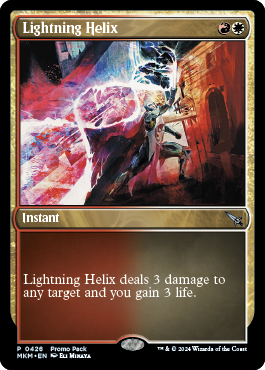
7. “Topdeck”
Often enough, Steven gets excited about the games he spectates. At one point, he shouts “LOL THIS TOPDECK!!!”
It happens regularly and it's usually not OA, because it's too unspecific to be treated as play advice. It doesn't reveal hidden information, not even if the recently drawn card is a land or not, because his comment is value-free for both players.
Depending on the volume, it may be a kind of Unsporting Conduct, but that's off topic for today :)

8. “Result Knowledge”
In the last round of Swiss, there's a pairing combination where Steven is paired down. Adam knows, that if Steven wins, Adam can draw against Berta and still make Top8. If Steven loses however, Adam is in the Top8 only with a win over Berta.
Steven finishes his match, he passes by Adam and happily announces “I won!”
What if Steven was going to pass by silently, but Adam interrups him, asking “Did you win?”.
Personally, I was surprised by what the other judges of my area said about those situations, so I'll leave this situation entirely open for you to discuss first.


9. "Vampire Nighthawk and Ruric Thar"
Adam asks Berta what her chinese Vampire Nighthawk is. Berta replies 2/3 Flying Lifelink, legally ommitting the Deathtough part. Fortunately for Adam, Steven is around and completes what Berta missing “It also has Deathtouch”.
Here, we agreed that context matters. Is there a 10/10 Flying creature that can will be blocked by Vampire Nighthawk ? In that case, knowledge on Deathtouch is relevant and a major strategic help for Adam. Will Deathtouch very likely not matter at all? Then, it is no Outside Assistance.
Recently, there was a similar question on Ruric Thar, the Unbowed in judge channels. We also discussed that one: If in an Elves mirrormatch, noting the existence of Reach doesn't matter and is not OA. In a match where the Reach ability matters (against Inkmoth Nexus, ..), it is OA. In the end, it's a judgement call. To improve the consistency of those judgement calls, it was worth discussing.
10. "Which Borborygmos?"
Adam casts Pithing Needle and names "Borborygmos". Steven has read about a recent Borborygmos vs. Borborygmos Enraged discussion on reddit, so he asks Adam "Which Borborygmos??"
Here we were completely undecided. Whom does Steven give the Outside Assistance here? The information that there are two Borborygmos in the game can easily help Adam. He may cast his second Pithing Needle naming the right Borborygmos Enraged. Thee information that said Pithing Needle doesn't actually name Borborygmos Enraged in Berta's deck can also easily help Berta. She is made aware that “the combo still works.”
Overall, we were slightly favored towards “no Outside Assistance” in a quick majority vote. For example, if this situation wasn't about Borborygmoses but Jaces, suddenly Steven clears out a possible GRV (naming ambigious Jace for Pithing Needle).
Yeah, this was a lot of similar situations, with some close calls or even “had to be there” situations.
At the monthly meeting, we have the facility to explain more details of the examples. In the end, the discussions can have only positive effects on the involved judges.
If through reading this or possibly following comments in this thread, I could give you as judge some little more insight on Outside Assistance, I reached my personal aim. Maybe we overinterpreted things into the term ‘play advice’ at the meeting? If we're all completely ‘wrong’ on the policy perspectives discussed here at the meeting, then we can learn from it. Either way, someone can improve their judging skills.
To further delve into OA, i'd love to see some argument for and/or against a ruling of Outside Assistance on the cases “Which Borborygmos”, “Result Knowledge” and “19 lands”.
I noticed there were more discussions/questions about TE - Outside Assistance recently, which means to me it is not clear how certain situations get ruled on events by different judges.
We're still alive in Frankfurt. And we still meet every month. Mostly, there's more non-judge-talk than judge-talk so it wasn't worth reporting about it in late summer. For the meeting in November, I decided to try to strengthen the consistency on rulings and knowledge about TE - Outside Assistance in my area.
IPG 3.2 Outside assistance definition
Definition // Penalty: Match Loss
A player, spectator, or other tournament participant does any of the following:
• Seeks play advice or hidden information about his or her match from others once he or
she has sat for his or her match.
• Gives play advice or reveals hidden information to players who have sat for their match.
• During a game, refers to notes (other than Oracle™ pages) made before the official
beginning of the current match.
Philosophy
Tournaments test the skill of a player, not his or her ability to follow external advice or directions. Any strategy advice, play advice, or construction advice from an external source is considered outside assistance.
Here's the specific situations we discussed, typically Adam is in a game against Berta, Steven is the Spectator that may have committed Outside Assistance. We assume no premade code between players and Steven, nor bad intent. It is Competitive REL.
1. "Batterskull"
Adam casts Batterskull, but doesn't put a 0/0 Germ token onto the battlefield. He is about to make more game actions, but Steven (gently) throws a physical copy of a 0/0 Germ token on the table.
Steven reminded Adam of a triggered ability. Even if the trigger is still missed, Adam being made aware that he has no creature on the battlefield that way received play advice. We agree on Outside Assistance
2. "Lol, rekt! Fumigate"
Berta controls 10 creatures. Adam controls none. Steven sees a Fumigate in Adam's hand and shouts “LOL REKT!!! Pulling out the 1 to 10 trade!”
This is textbook OA because Steven, although not completely explicit, revaled hidden information: content of Adam's hand, to the players.
3. “Not enough removal?”
During deckbuilding of a Sealed GP, Steven, having finished deckbuilding wanders around and sees Adam, with Adam's deck layed out in front of him. Adam is not finished yet, he ponders silently about the last decisions. Steven casually comments: “Nice bombs, but I think it's too few removal?”
This is also textbook OA, because Adam isn't done deckbuilding yet. Steven advises Adam to play more removal spells in his Sealed deck.
4. "Planar Void vs Rest in Peace"
Adam controls Planar Void. A creature under Berta's control dies. She puts the creature into her graveyard, Adam misses the Planar Void trigger. Steven, spectating the match says “Stop, you have to exile that creature!”, thinking Planar Void worked like Rest in Peace (as replacement effect).
We agree that this is a case of Outside Assistance. It is unfortunate, because Steven thought a Game Rule Violation occurred, as it would be the case with Rest in Peace, but in the end, he reminds Adam of a triggered ability, which he will likely remember from now on.
5. “19 lands”
For the fifth time in a row, Adam draws a land and holds forth about his bad luck flooding out now. Steven asks “How many lands do you play?” and Adam replies “19”. Steven now says “Well, that's probably too many lands.”
Here, we had very varied perspectives. Some say “It's not so bad.”, some say it's technically OA, but feels really bad and shouldn't be OA, some say it is “just not OA, but close”, some say it depends on several factory.
What do you say ? Does it matter in which game of a match we're at ?
6. “Ugin from the top”
In a Limited format, Adam controls several creatures. Currently he ponders about playing more. Steven knows that Berta has an Ugin, the Spirit Dragon in her deck. He gets excited because Ugin could devastate Adam's board at the moment, so he exclaims “Oh my god, and now the Ugin from the top!” to the players.
Essentially, this sentence is play advice. Knowledge about Ugin in Berta's deck isn't necessary for this to be OA. Steven basically says “There exist board wipes, one shouldn't overextend now.”, so we agree that this was OA by Steven.
However, there's a twist. “Oh my god, and now the Ugin from the top!” isn't always OA. For example, when players play a Modern Dredge Mirrormatch, it's completely unreasonable for one to have Ugin in their deck. In those cases, or when Ugin isn't legal in the format, that parenthesis is no longer OA.
7. “Topdeck”
Often enough, Steven gets excited about the games he spectates. At one point, he shouts “LOL THIS TOPDECK!!!”
It happens regularly and it's usually not OA, because it's too unspecific to be treated as play advice. It doesn't reveal hidden information, not even if the recently drawn card is a land or not, because his comment is value-free for both players.
Depending on the volume, it may be a kind of Unsporting Conduct, but that's off topic for today :)
8. “Result Knowledge”
In the last round of Swiss, there's a pairing combination where Steven is paired down. Adam knows, that if Steven wins, Adam can draw against Berta and still make Top8. If Steven loses however, Adam is in the Top8 only with a win over Berta.
Steven finishes his match, he passes by Adam and happily announces “I won!”
What if Steven was going to pass by silently, but Adam interrups him, asking “Did you win?”.
Personally, I was surprised by what the other judges of my area said about those situations, so I'll leave this situation entirely open for you to discuss first.
9. "Vampire Nighthawk and Ruric Thar"
Adam asks Berta what her chinese Vampire Nighthawk is. Berta replies 2/3 Flying Lifelink, legally ommitting the Deathtough part. Fortunately for Adam, Steven is around and completes what Berta missing “It also has Deathtouch”.
Here, we agreed that context matters. Is there a 10/10 Flying creature that can will be blocked by Vampire Nighthawk ? In that case, knowledge on Deathtouch is relevant and a major strategic help for Adam. Will Deathtouch very likely not matter at all? Then, it is no Outside Assistance.
Recently, there was a similar question on Ruric Thar, the Unbowed in judge channels. We also discussed that one: If in an Elves mirrormatch, noting the existence of Reach doesn't matter and is not OA. In a match where the Reach ability matters (against Inkmoth Nexus, ..), it is OA. In the end, it's a judgement call. To improve the consistency of those judgement calls, it was worth discussing.
10. "Which Borborygmos?"
Adam casts Pithing Needle and names "Borborygmos". Steven has read about a recent Borborygmos vs. Borborygmos Enraged discussion on reddit, so he asks Adam "Which Borborygmos??"
Here we were completely undecided. Whom does Steven give the Outside Assistance here? The information that there are two Borborygmos in the game can easily help Adam. He may cast his second Pithing Needle naming the right Borborygmos Enraged. Thee information that said Pithing Needle doesn't actually name Borborygmos Enraged in Berta's deck can also easily help Berta. She is made aware that “the combo still works.”
Overall, we were slightly favored towards “no Outside Assistance” in a quick majority vote. For example, if this situation wasn't about Borborygmoses but Jaces, suddenly Steven clears out a possible GRV (naming ambigious Jace for Pithing Needle).
Yeah, this was a lot of similar situations, with some close calls or even “had to be there” situations.
At the monthly meeting, we have the facility to explain more details of the examples. In the end, the discussions can have only positive effects on the involved judges.
If through reading this or possibly following comments in this thread, I could give you as judge some little more insight on Outside Assistance, I reached my personal aim. Maybe we overinterpreted things into the term ‘play advice’ at the meeting? If we're all completely ‘wrong’ on the policy perspectives discussed here at the meeting, then we can learn from it. Either way, someone can improve their judging skills.
To further delve into OA, i'd love to see some argument for and/or against a ruling of Outside Assistance on the cases “Which Borborygmos”, “Result Knowledge” and “19 lands”.
Nov. 2, 2016 08:23:15 PM
- Brock Ullom
- Uncertified, Judge
- USA - Pacific Northwest
November judge meeting - Outside Assistance
Regarding the 19 Land scenario, I believe this is OA. I would consider Regarding the comment that he might have too many lands, qualifies as play advice because it's indirectly advising Adam to cut some lands during sideboarding.
Result Knowledge is not OA. Adam is not allowed to go out of his way or stall his game in order to figure out the results of another match, but if that information is acquired at his table without pausing the match than he's fine. Asking about a result as Steven passes is fine as long as he isn't stalling in his game.
Which Borborygmos…I lean toward this being outside assistance. Much like the fumigate incident, Adam is indirectly giving information about Berta's deck by implying “Hey Adam, make sure you name the right card.” Against the argument that it's similar to if a player just names Jace, there is no card in Magic named Jace. However, there is a card simply named Borborygmos, Adam named a legal card and Steve's attempt to get him to change his mind constitutes OA
Result Knowledge is not OA. Adam is not allowed to go out of his way or stall his game in order to figure out the results of another match, but if that information is acquired at his table without pausing the match than he's fine. Asking about a result as Steven passes is fine as long as he isn't stalling in his game.
Which Borborygmos…I lean toward this being outside assistance. Much like the fumigate incident, Adam is indirectly giving information about Berta's deck by implying “Hey Adam, make sure you name the right card.” Against the argument that it's similar to if a player just names Jace, there is no card in Magic named Jace. However, there is a card simply named Borborygmos, Adam named a legal card and Steve's attempt to get him to change his mind constitutes OA
Edited Brock Ullom (Nov. 2, 2016 10:36:33 PM)
Nov. 2, 2016 10:26:32 PM
- David Poon
- Uncertified, Judge, Scorekeeper
- Canada - Western Provinces
November judge meeting - Outside Assistance
Regarding “19 Lands”, I think context counts, just as it was considered for #6 and #9. If this were the third game of the match, I would not rule OA, but would instead warn Steven that it would have been OA had Adam been able to sideboard later in the match.
Nov. 3, 2016 01:26:50 AM
- Loïc Hervier
- Member (International Judge Program), Judge
- German-speaking countries
November judge meeting - Outside Assistance
Regarding the first scenario with Batterskull, I don't understand why "the trigger is still missed" since Adam has not taken any other game actions that could only be taken after the trigger had resolved.
Nov. 3, 2016 03:04:30 AM
- Toby Hazes
- Uncertified, Judge
- BeNeLux
November judge meeting - Outside Assistance
5. “19 lands”
OA.
What if the third game draws before time is up? ^^;
8. “Result Knowledge”
Not OA.
The decision to offer or accept a draw or scoop does not fall within “play advice”.
9. “Vampire Nighthawk and Ruric Thar”
Not OA.
Similar scenario: http://apps.magicjudges.org/forum/topic/5185/
(It is OA though if Steven said it with the purpose to give OA)
10. “Which Borborygmos?”
OA.
Went back and forth on this one, but currently I think this is similar to “Planar Void vs Rest in Peace”
If Planar Void was Rest in Peace, suddenly Steven clears out a possible GRV. Scenarios that seem the same to players can result in different rulings, so Jace and Borgorygmos can result in a different ruling to. In the Jace case, it's clearing out a GRV, in the Borborygmos case, it's reminding the players that the Borb needled and the Borb in the deck are 2 different cards, so OA.
However, I also see the argument that this is similar to the previous scenario but only in the case where Steven thought just Borborygmos wasn't a legal choice. While “Don't forget your triggers” is direct play advice, “that card bounces your board”/“that card has deathtouch” is only indirect/derived advice that could lead to “so I should counter it”/“so I shouldn't attack into it”. The argument could be made that “there are 2 borgs in the format” is not play advice itself even though it could lead to altered plays.
OA.
Originally posted by David Poon:
Regarding “19 Lands”, I think context counts, just as it was considered for #6 and #9. If this were the third game of the match, I would not rule OA, but would instead warn Steven that it would have been OA had Adam been able to sideboard later in the match.
What if the third game draws before time is up? ^^;
8. “Result Knowledge”
Not OA.
The decision to offer or accept a draw or scoop does not fall within “play advice”.
9. “Vampire Nighthawk and Ruric Thar”
Not OA.
Similar scenario: http://apps.magicjudges.org/forum/topic/5185/
(It is OA though if Steven said it with the purpose to give OA)
10. “Which Borborygmos?”
OA.
Went back and forth on this one, but currently I think this is similar to “Planar Void vs Rest in Peace”
For example, if this situation wasn't about Borborygmoses but Jaces, suddenly Steven clears out a possible GRV (naming ambigious Jace for Pithing Needle).
If Planar Void was Rest in Peace, suddenly Steven clears out a possible GRV. Scenarios that seem the same to players can result in different rulings, so Jace and Borgorygmos can result in a different ruling to. In the Jace case, it's clearing out a GRV, in the Borborygmos case, it's reminding the players that the Borb needled and the Borb in the deck are 2 different cards, so OA.
However, I also see the argument that this is similar to the previous scenario but only in the case where Steven thought just Borborygmos wasn't a legal choice. While “Don't forget your triggers” is direct play advice, “that card bounces your board”/“that card has deathtouch” is only indirect/derived advice that could lead to “so I should counter it”/“so I shouldn't attack into it”. The argument could be made that “there are 2 borgs in the format” is not play advice itself even though it could lead to altered plays.
Edited Toby Hazes (Nov. 3, 2016 04:22:47 AM)
Nov. 3, 2016 12:29:22 PM
- Eli Meyer
- Level 1 Judge (Judge Foundry), Judge
- USA - Northeast
November judge meeting - Outside Assistance
Concluding that case #1 is OA makes me very uncomfortable. I realize that there is a slim possibility that the trigger was missed and handing the token reminded the player of it, but this seems like a stretch; handing out tokens is just generally friendly behavior that almost never impacts a match.
Originally posted by Toby Hazes:The post you've linked to is 3.5 years old, is it still up to date?
9. “Vampire Nighthawk and Ruric Thar”
Not OA.
Similar scenario: http://apps.magicjudges.org/forum/topic/5185/
(It is OA though if Steven said it with the purpose to give OA)
Nov. 3, 2016 12:41:21 PM
- Riki Hayashi
- Uncertified, Judge, Scorekeeper, Tournament Organizer
- USA - Midatlantic
November judge meeting - Outside Assistance
At the Modern Masters GP Chiba, I had to wave off the coverage writer from offering a token when Tukatongue Thalid died. As a judge, you should not act until the player acknowledges the trigger.
Nov. 3, 2016 01:03:38 PM
- Eli Meyer
- Level 1 Judge (Judge Foundry), Judge
- USA - Northeast
November judge meeting - Outside Assistance
Originally posted by Riki Hayashi:I've done the same thing on coverage at a GP top 8. After a judge handed a player an Eldrazi Scion while the player's Eldrazi Skyspawner was on the stack, I pulled him aside and politely reminded him why he should not do that. However, no one noticed. Neither player complained, coverage didn't notice, and the head judge didn't care. It was an “oops, I'll be more careful” moment.
At the Modern Masters GP Chiba, I had to wave off the coverage writer from offering a token when Tukatongue Thalid died. As a judge, you should not act until the player acknowledges the trigger.
The idea that a player doing essentially the same thing should get a Match Loss seems…extreme.
Nov. 3, 2016 05:57:35 PM
- Philip Böhm
- Member (International Judge Program), Judge, Tournament Organizer
- German-speaking countries
November judge meeting - Outside Assistance
In the Missed Trigger / OA cases, could we say it is OA if the missed trigger would have no penalty attached to it, but is not OA if someone misses their own trigger which is detrimental to them ?
Example:
Steven points out Adam's Sulfuric Vortex trigger during Adam's upkeep. -> no OA, Adam will get a penalty for MT
Steven points out Adam's Sulfuric Vortex trigger during Berta's upkeep. -> OA, Adam will get no penalty for MT.
or would that cause more problems?
Example:
Steven points out Adam's Sulfuric Vortex trigger during Adam's upkeep. -> no OA, Adam will get a penalty for MT
Steven points out Adam's Sulfuric Vortex trigger during Berta's upkeep. -> OA, Adam will get no penalty for MT.
or would that cause more problems?
Edited Philip Böhm (Nov. 3, 2016 05:59:43 PM)
Nov. 4, 2016 05:07:11 AM
- Valdas Kalvis
- Uncertified, Judge, Scorekeeper
- Europe - North
November judge meeting - Outside Assistance
Outside Assistance, my favorite topic :)
On 7. The topdeck reaction.
(Example 7.1.) What if the winning play after that topdeck is not obvious and a player could easily miss it? E. g. a pair standards ago, let's say, Abzan mirror, the time is called, it's the last turn, Bertha is at 3 life, board is stalled, Adam is digging for Siege Rhino. Adam topdecks Abzan Charm. (Reminder: the modes that were used the most were card draw/exile the creature) The winning play is putting two counters on a 1/1 evasive creature. The spectator realizes it and vocally reacts (w/o mentioning the path to victory). Is it OA, knowing that Adam very likely is set on drawing as many cards as possible to hit Rhino?
On 10 (I suppose this fits here the best):
(Example 10.1) Abzan mirror again, Adam is at healthy life total, Bertha is at 3 but just managed to stabilize the board. Adam draws some cards, hits Thoughtseize and (maybe) Siege Rhino, casts Thoughtseize (no more mana). Bertha reveals Siege Rhino, Ugin and something irrelevant. The spectator wanders to the match, sees Seize on the stack and cards laid down and inquires about life totals. Is it OA? Ugin is a real trump in the mirror and would be the usual choice, but Rhino puts Bertha out of losing life total range. Would your answer here be different if Adam has Rhino in hand vs no Rhino?
On 7. The topdeck reaction.
(Example 7.1.) What if the winning play after that topdeck is not obvious and a player could easily miss it? E. g. a pair standards ago, let's say, Abzan mirror, the time is called, it's the last turn, Bertha is at 3 life, board is stalled, Adam is digging for Siege Rhino. Adam topdecks Abzan Charm. (Reminder: the modes that were used the most were card draw/exile the creature) The winning play is putting two counters on a 1/1 evasive creature. The spectator realizes it and vocally reacts (w/o mentioning the path to victory). Is it OA, knowing that Adam very likely is set on drawing as many cards as possible to hit Rhino?
On 10 (I suppose this fits here the best):
(Example 10.1) Abzan mirror again, Adam is at healthy life total, Bertha is at 3 but just managed to stabilize the board. Adam draws some cards, hits Thoughtseize and (maybe) Siege Rhino, casts Thoughtseize (no more mana). Bertha reveals Siege Rhino, Ugin and something irrelevant. The spectator wanders to the match, sees Seize on the stack and cards laid down and inquires about life totals. Is it OA? Ugin is a real trump in the mirror and would be the usual choice, but Rhino puts Bertha out of losing life total range. Would your answer here be different if Adam has Rhino in hand vs no Rhino?
Nov. 7, 2016 01:55:11 AM
- Emilien Wild
- Forum Moderator
- Level 2 Judge (International Judge Program), Judge
- BeNeLux
November judge meeting - Outside Assistance
Spectators are responsible for remaining silent and passive during matches and other official tournament sections in which players are also required to be silent.1.11 Spectators in the MTR
This is what is important to me. As soon as a spectator breaks this rule, he or she is already committing an infraction (even if that's not an infraction recorded in the IPG), and that behaviour should be stoped at once and the spectator educated.
Knowing if this infraction carries a penalty or not is important, but less than the on going education effort: if we are educating spectators to be silent and passive, the risk of them damaging the integrity of a game becomes lower. We have two lines in the sand, and the best way to prevent them to pass the second line is to educate them to not pass the first one to begin with.
As for the specifics iof outside assistance, while I understand the want to have consistent rulings backed up by precise rules, it's also important to understand that having that for each infraction would require a far more comprehensive IPG. That's why we ask judges to use their judgment, based on the penalty description, examples, and philosophy.
And as usual, for such subjective infractions, in the same vein as Slow Play or Unsporting Conduct, the fact that you ask yourself if the infraction has been committed is already a red flag.
- Emilien
Replies have been disabled because this topic is closed.
- Index
- » Competitive REL
- » November judge meeting - Outside Assistance